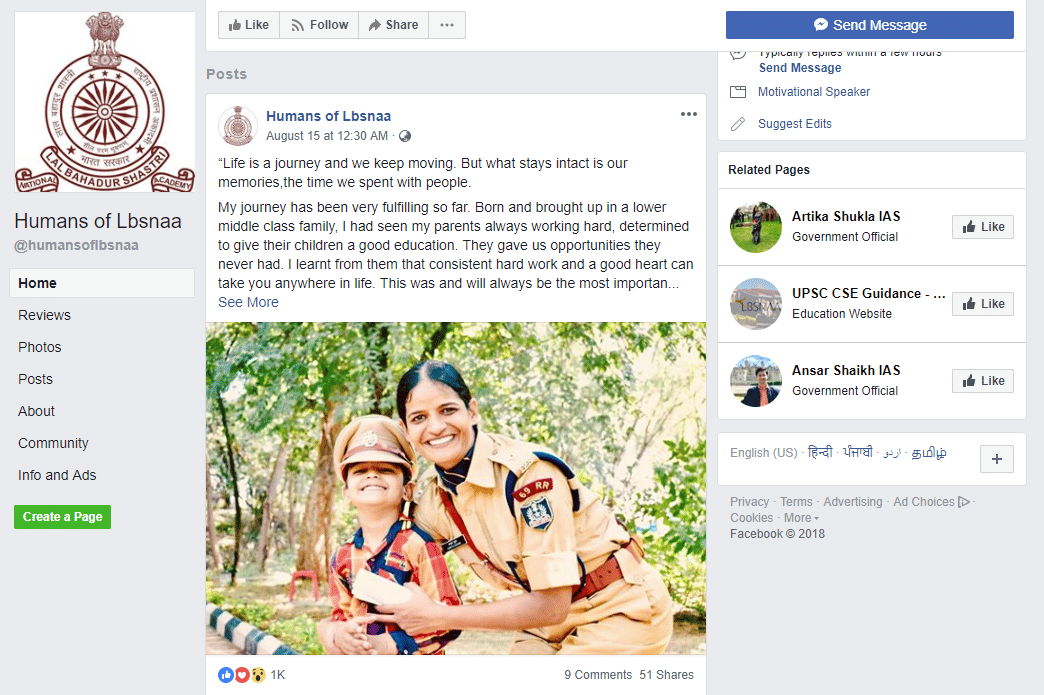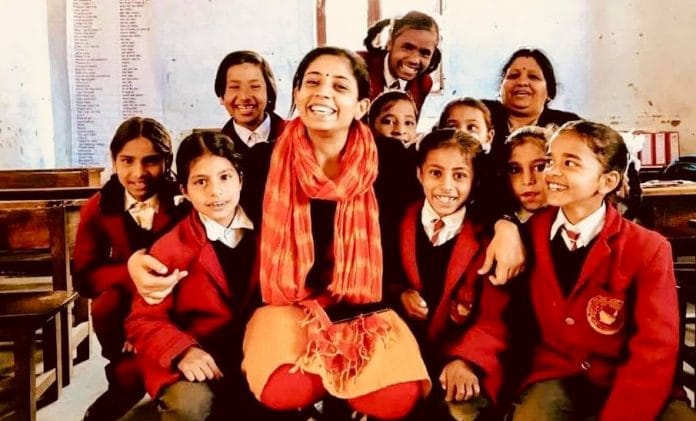Spurred on by an aspirant’s suicide earlier this year, the officers have started a Facebook page to share stories of civil servants’ struggles to make it.
New Delhi: Back in June, a 28-year-old UPSC aspirant committed suicide for not being allowed entry into the examination hall. It was another chilling reminder of the kind of pressure aspirants face — nearly five lakh appear for the examination every year, and less than a thousand end up getting selected.
The incident spurred three young IAS officers into action — something had to be done to bring down the examination from its rarefied, haloed stature, and normalise it for those who aspire to be part of India’s coveted civil services.
Also read: How an IAS officer in Kerala used Facebook to help flood victims
Their idea? Humanise the faceless bureaucracy. Share the struggle behind the glamour. Start a Facebook page and reach out to as many aspirants as possible, to avert any more suicides due to the pressure of the exam.
Thus was born a page called ‘Humans of LBSNAA’ — standing for the Lal Bahadur Shastri National Academy of Administration, the finishing school for India’s civil servants.

“We were hearing of so many chilling cases of suicide by candidates who don’t make it to the services, and we thought this has to be because there is no awareness about the actual struggles,” said Jitin Yadav, a 2016 batch West Bengal cadre IAS officer, who runs the page with his batchmates Torul Raveesh and Devansh Yadav.
“In India, bureaucracy has such a high status. When someone becomes a bureaucrat, they have a certain kind of aura around them. But people don’t know what goes into that. We thought we should reach out to people using social media, especially aspirants, and tell them successful stories of people who have struggled for years to crack the exam.
“Before we started this page, we didn’t even know our own batch mates’ stories… So we thought there is a need to humanise bureaucrats, tell people we’re one of them — that’s why the name ‘Humans of LBSNAA’.”
Compelling stories
The most recent story posted on the page is that of 2017 batch IAS officer Kempahonnaiah, who lost his eyesight at the age of nine.
Kempahonnaiah says growing up, he played the role of “an involuntary clown who couldn’t understand the coordinates of normal clothing — wearing it inside out and upside down”.
Through his story, he talks to the aspirants who may be bogged down by the pressures of the examination about the added disadvantage of blindness, and how he overcame it to finally become a bureaucrat.
“My wife dedicated close to 10 hours a day just for my preparation, she would read out to me; make audio notes,” the post says.
“I tell this story not to jolt you — I tell it because I want to tell each one of you to never stop aspiring and never give up.”
There are 29 other stories posted on the page so far, and Yadav says there’s a number of ways they’ve been sourcing these stories.
“We mostly reach out to people and interview them for 5-10 minutes, storify their interviews, send them back for approval and then post them,” he says. “Sometimes people send us their stories themselves on WhatsApp, email, etc.”
Two months since it came up, the page has over 21,000 followers. A Twitter handle @humansoflbsnaa has also been started.
The people currently running the page say they plan to pass on its admin rights to subsequent batches of civil servants.
Undocumented aspect of Indian bureaucracy
While most of the contributors to the group so far have been younger bureaucrats, the trio seeks to diversify its base of storytellers in the future.
“Recently, we were approached by a woman in Singapore whose father became India’s first engineer-IAS officer in 1962. It would be a fascinating story,” says Jitin.
The administrators are also in touch with senior and retired bureaucrats, who seem to be closely following the page and appreciating the effort.
“This page brings forth a very human aspect of those who clear services — their horrid and difficult past. It brings an absolutely new dimension to the bureaucracy,” says Anil Swarup, who recently retired as secretary in the human resource development ministry. “This side of Indian bureaucracy has never been documented before.”
Also read: Unhappy with ‘generalist’ tag, IAS body wants appointment based on qualification
Moreover, by telling stories of economically-disadvantaged candidates who cleared the exam, the page dispels the notion that one needs to be well-off to become a bureaucrat, says Swarup.
“There is a sea change in the constitution of the Indian bureaucracy now. It’s like Indian cricket, which first started with the elites from Delhi and Bombay, but is now truly pan-Indian. The page also emphasises this diversity,” he added.







Failure especially after years and years of hard work may lead to suicide. The best of the best brains become IAS officers so I wonder what leads to their suicidal behavior AFTER they have been selected and are serving. There have been so many cases of serving IAS officers committing suicide that it boggles your mind.
Presuming only best brains of the nation prepare for cs exam , I wonder what percentage is scarred for life when success eludes them after years of hard work. Our most talented youth is turned into frustrated souls who, by no means, are able to contribute to the society what they otherwise were capable of. What a waste of human resource. They should highlight the examples of those who could not make it to the final list but benefited from the preparation and became very successful and famous in their respective fields.
Lord slowly and steady they behave like british Lords
Suppressing
Humiliating
Every one possible
अपने बच्चों के लिए संस्कृति स्कूल
They leave a big burdan on their children
Most of children fail to carry
Your goodness!I want to take this changing trend into account.the initiative taken by them has many dimensions. In the present, the prestigious IAS examination has become a soft nut to be cracked by everyone.an accountability is Los in the thinking air.many reasons are responsible for this.deception is a factor but it isn’t whole of it.whatever the condition , introspection is the need of the hour.
I am very happy to hear about the success of Kempahonnaiah and pray more specially abled children achieve greater laurels in life. Its a big challenge for them where the society needs to be more sensitive and empathetic towards them. Its imperative the present government takes special steps to provide educational opportunities and employment opportunities with assured state care as they outlive their parents.
with grt power it has some disadvantages.
no need to make issue of it.
the same pressure is for all ordinary common citizens with no power.
I read it to find thevpriblems faced by bureacracy …thiught it is an attempt to DEGLAMOURISE the job . Sorry to say but it is again a RECORD OF SUCCESSFUL PEOPLE .. though after a struggle . People waste prime of their youth in preparation . They should receive the message that NOT GETTING INTO CIVIL SERVICES IS NOT THE END OF LIFE . Pl donot encourage them to go on struggling ….. max two attempt … max 2 to 3 years of their lives shall they devote to these attempts . After that they shall move on to something more suitable to them .
The only way out is to amend the selection process. What my take on the respective topic is related to overhaul the process and make it friendly to those like experienced professionals, ie. Civil services or any government Exam should be limited to those who are working professionals or enrolled in any course irrespective of their field and that person should have that current position or must be of final year or graduation or recently qualified respectively during the interview. Simultaneously UPSC should downgrade the syllabus a little so that individuals can cope up with. Now it has many advantages that are delineated – (1) It will reduce the burden on economy (by enrolling them into workforce) (2) students will face little or no trauma on no selection (due to their secure jobs) (3) experienced workforce will enter the field of public administration.
The issue by the officers has been wrongly framed though it is commendable. It is not the wasted efforts that spur the aspirants to take drastic step but the sense of missing an opportunity of acquiring a Demi-god like status after making it rankles them. In fact, we need not only to humanise the effort part by highlighting struggles of successful candidates but we need to humanise the selected group and those already in service. The moment people join the civil service, or rather are selected, they themselves start treating themselves as a class with privileges and beyond the reach of common man. This sense of exclusiveness dehumanise the civil servants and they stop being public servants. We need to address the gap between the top three civil services and the rest of the services to humanise the services itself and not only the preparation process as glamour that is bestowed upon the successful candidates kills the unsuccessful candidates. So humanising the service is the requirement of the day when all the services and public servants irrespective of status of the service will be recognised by their contribution to the governance process however small the service may be.
The comment by Manas is not objective,one cannot generalise and condem all to the gallows.In my years of IAF service I have also come across for example Vinod Rai son of an Army Officer,long long ago in Trivandrum on a VVIP flight.
Before leaving the Airforce I handled an IAS batch which had come on their compulsory visit of an Armed Forces establishment.Each person was given a momento emblazoned with ‘Adminstration is the 10th Principle of War”( actually in India one of the 10).
The first question I posed to them was ‘how many of you are in favour of abolishing the IAS?’There was pin drop silence and no one raised ther hand.Then I explained.’The best of you with the best of intentions posted to the Min of Finance will not be able to clear the mess there.
One one lady daughter of an IAS officer invited me to their academy where I went later on to a delightful NE breakfast and a discourse on their syllabus with emphasis on Public Good.
Years later on the net I saw that this lady Varsha along with her IPS hubby both of Gujarat cadre had lived up to the steel frame.Many though do not do so and fall by the wayside.
At the NDA where boys become men,any weakness in mind body and soul is not tolerated.A coursemate of mine attempting suicide was sent home.
Regards
Wg Cdr KJ’Kojak’Bhatt
YouTube.com/kopterkojak/Airforceballad.
The heading is slightly misleading. It was expected that the article would through some light on how not everything is hunky dory once one becomes an IAS officer/ bureaucrat.
IAS, IPS etc are glorified servants of powerful politicians. To maintain a somewhat normal life, they sell their conscience and self-respect for power and ill-gotten gains.